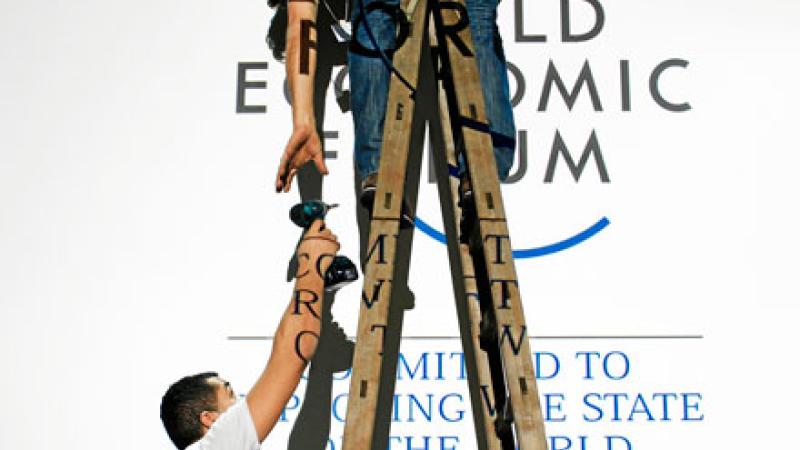Rensselaer Faculty Also to Present “Ideas Lab” in Davos
January 22, 2012

Rensselaer Polytechnic Institute President Shirley Ann Jackson, and a delegation of Rensselaer faculty are among global leaders in government, business, academe, media, and the arts who will convene at the World Economic Forum 2012 Annual Meeting in Davos, Switzerland. This year’s meeting, titled "The Great Transformation: Shaping New Models,” will be held Jan. 25 to 29.
President Jackson, a member of the WEF Science Advisory Committee and participant in the WEF’s Global University Leaders Forum, will give opening remarks at a Rensselaer “Ideas Lab” on Jan. 27, focusing on outcomes resulting from the decade-long transformation of the Institute. Featuring research from “Concept to Commerce,” the faculty will highlight achievements at the nexus of nanotechnology, biotechnology, and complex networks. On Jan 26, Dr. Jackson will moderate a discussion on what lies ahead in the digital world.
Rensselaer faculty presenting at the Ideas Lab include Center for Biotechnology and Interdisciplinary Studies Director Jonathan Dordick, Social Cognitive Networks Academic Research Center Director, Boleslaw Szymanski, and Rensselaer Nanotechnology Center Director Richard W. Siegel.
"Scientific discovery and technological innovation are at the core of the solutions to many of the great challenges and opportunities of our time. Universities play a significant, though perhaps under–recognized, role in generating the ideas and sparking the innovations that drive the global economy and sustain our security. It is imperative that universities, business, and governments, along with NGOs, collaborate in charting a sustainable path forward,” Jackson said. “This gathering of world leaders offers an unparalleled opportunity to set the goals and enhance the interconnections that can help strengthen our various and collective institutions as we work to meet the challenges and tap the opportunities before us.”
The World Economic Forum describes itself as “an independent international organization committed to improving the state of the world by engaging business, political, academic and other leaders of society to shape global, regional and industry agendas.”
The theme of this year’s Meeting, The Great Transformation: Shaping New Models, “reflects the need for a profound overhaul in the face of a fraying global system and lingering economic malaise,” according to meeting organizers. Outlining the agenda for the annual meeting, Klaus Schwab, Founder and Executive Chairman, World Economic Forum said: “Capitalism, in its current form, no longer fits the world around us. We have failed to learn the lessons from the financial crisis of 2009. A global transformation is urgently needed and it must start with reinstating a global sense of social responsibility.”
According to the World Economic Forum: The four sub-themes of the Meeting, which reflect the interconnected nature of the changes required, are: Growth and Employment Models; Leadership and Innovation Models; Sustainability and Resource Models; and Social and Technological Models. There will also be a strong focus on risk mitigation and management, with one room dedicated to discussions pursuing the themes of the Global Risks 2012 report.
"Participation in the World Economic Forum broadens Rensselaer's reach and impact,” President Jackson said. “It is particularly important as we work to expand opportunities for our students to enhance their multi-cultural sophistication in preparation for leadership in the global economy,"
A theoretical physicist, Dr. Jackson has held senior leadership positions in government, industry, research, and academe. Her research and policy focus includes global energy security and the national capacity for innovation, including addressing what she has dubbed the “Quiet Crisis” of looming gaps in the science, technology, and engineering workforce and reduced support for basic research. Dr. Jackson was chairman of the U.S. Nuclear Regulatory Commission from1995 to 1999, and currently is a member of the President’s Council of Advisors on Science and Technology (PCAST), co-chairs the President's Innovation and Technology Advisory Committee (PITAC), and is a member of the U.S. Department of State International Security Advisory Board (ISAB). She is a member of the National Academy of Engineering, the American Philosophical Society, and a Fellow of the American Academy of Arts and Sciences, the American Physical Society, and the American Association for the Advancement of Science (AAAS). She is a Regent of the Smithsonian Institution, and a member of the Board of the Council on Foreign Relations and The Brookings Institution. She is a vice-chair of the Council on Competitiveness and co-chaired its Energy Security, Innovation and Sustainability initiative. She also is a member of the Board of Directors of global companies including IBM and FedEx.
About Rensselaer
Rensselaer Polytechnic Institute, founded in 1824, is the nation’s oldest technological research university. The university offers bachelor’s, master’s, and doctoral degrees in engineering, the sciences, information technology, architecture, management, and the humanities and social sciences. Institute programs serve undergraduates, graduate students, and working professionals around the world. Rensselaer faculty are known for pre-eminence in research conducted in a wide range of fields, with particular emphasis in biotechnology, nanotechnology, computation and information technology, the media arts and technology, and energy and the environment. The Institute is well known for its success in the transfer of technology from the laboratory to the marketplace so that new discoveries and inventions benefit human life, protect the environment, and strengthen economic development.
For information about the World Economic Forum 2012 Annual Meeting go to:
http://www.weforum.org/events/world-economic-forum-annual-meeting-2012